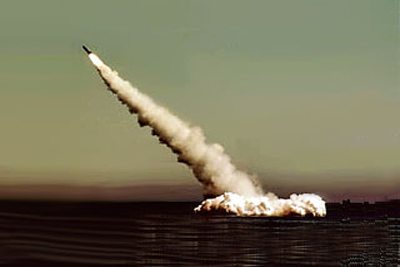Software glitches in the automated launch control system on board the Borey class strategic submarines has caused a new delay in scheduled tests of the Bulava submarine-launched ballistic missile (SLBM), Defense Minister Anatoly Serdyukov said.
“There are technical problems involving software in the automated launch control system, and we are trying to fix them,” Serdyukov told reporters on Friday.
The minister expressed hope that the next test-launch of the Bulava missile from Russia’s second Borey class submarine, the Alexander Nevsky, could be carried out before the end of the year.
All previous test launches were conducted from the Typhoon class Dmitry Donskoy submarine and the first Borey class submarine, the Yuri Dolgoruky.
The Bulava (SS-NX-30) SLBM, developed by the Moscow Institute of Thermal Technology (since 1998), carries up to 10 MIRV warheads and has a range of over 8,000 kilometers (5,000 miles). The three-stage ballistic missile is designed for deployment on Borey class nuclear submarines.
Despite several previous failures, officially blamed on manufacturing faults, the Russian military has insisted that there is no alternative to the Bulava.
Serdyukov also admitted on Friday that the handover of the Yury Dolgoruky submarine to the Russian Navy by the United Shipbuilding Corporation (USC) has been delayed again, this time indefinitely, due to a number of technical flaws.
“The USC has so far failed to deliver the Yury Dolgoruky submarine,” the minister said.
“I am not sure when they will fix all the problems [with the sub] – they are still not able to get it done,” Serdyukov added.
The Borey class is set to become the mainstay of the Russian Navy’s strategic nuclear deterrent fleet, replacing the ageing Project 941 (NATO Typhoon class) and Project 667 (Delta-3 and Delta-4 class) boats.











